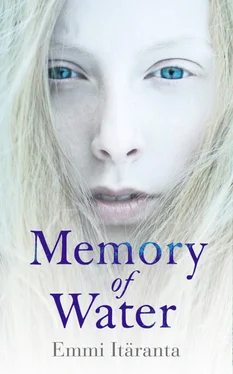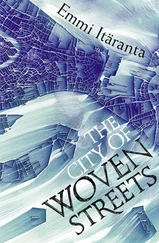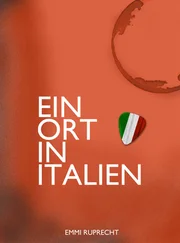‘Past-world tea masters knew stories that have mostly been forgotten,’ he said quietly. ‘But one is recorded in every tea master’s book we kept in our house. The story tells that water has a consciousness, that it carries in its memory everything that’s ever happened in this world, from the time before humans until this moment, which draws itself in its memory even as it passes. Water understands the movements of the world, it knows when it is sought and where it is needed. Sometimes a spring or a well dries for no reason, without explanation. It’s as if the water escapes of its own will, withdrawing into the cover of the earth to look for another channel. Tea masters believe there are times when water doesn’t wish to be found because it knows it will be chained in ways that are against its nature. Therefore the drying of a spring may have its own purpose that must not be fought. Not everything in the world belongs to people. Tea and water do not belong to tea masters, but tea masters belong to tea and water. We are the watchers of water, but first and foremost we are its servants.’
We walked on in silence. Pebbles crunched under my feet. The scent of burning fires rose from the direction of the village.
‘You look happy,’ my father noted, when we reached the house. ‘That’s good. Today it’s time for you to be happy.’ He smiled at me. ‘It looks like the baker’s errand boy has left the feastcakes at the gate while we were away. Would you get them and bring them to the kitchen, please?’
I nodded and walked towards the gate, where three boxes of cakes were piled upon each other. When I turned to look, I saw my father had stopped and bent down. There was something rigid and painful about his posture, but the day was bright, and my mind was elsewhere, and I smelled the freshly-baked cakes in the wind. I did not look twice in his direction.
Memory has a shape of its own, and it’s not always the shape of life. When I think back now, I look in that day for omens and signs of what was to come, and sometimes I believe I see them. It’s a strange and hollow comfort, one that never carries me for long. Past-world seers used to read tea leaves to tell the future. But they are only tea leaves, dark residue of things gone by, and they spell no pattern except their own. Yet memory slips and slides and shatters, and its patterns are not to be trusted.
I remember standing in my room, my hair still dripping wet from the bath I’d had, water trickling down my chest and between my shoulder blades in narrow rivulets. My graduation outfit, which I would be wearing in tea ceremonies until its seams came apart, lay on the bed, empty like a skin not yet worn or perhaps already shed, waiting to be filled with meaning and movement, or else buried. The sharpest edge of this memory is the radiance of the day on the other side of the window: a blazing core of fire brimming with light, more brilliant than any day before or after, as if the sky was bursting to full flame before being glazed over by nightfall, before my world changed. I know this is not possible. I have seen radiant days before and after, and the brilliance I remember has an unnatural, blinding blade to it. But that day of my life has taken the shape of memory, and that is the only shape in which I can conjure it now. Its true, unchanged form is no longer within my reach.
I remember putting the tea master’s outfit on. It felt new and stiff around me.
I remember pulling my hair back with a large needle. It was heavy with moisture caught between the long strands.
I don’t remember walking to the teahouse, but I must have. There was nowhere else I could have gone.
Something was bothering my father. I had known it as soon as he crawled into the teahouse through the visitors’ entrance and looked around him. I suspected I had made some mistake I couldn’t recognise, but the ceremony had already begun and could no longer be interrupted. Master Niiramo, who had been invited from Kuusamo, had taken his place on a cushion by the back wall and removed his insect hood. I had no choice but to wait for my father to sit down next to him and carry on.
Niiramo had been invited for reasons of protocol. There were always two older tea masters present at the graduation ceremony, the teacher of the graduating apprentice and another master, an outsider. Niiramo performed tea ceremonies in Kuusamo and was on good terms with the local military regime. My father didn’t think much of him, but it was difficult to get tea masters to leave cities during Moonfeast, which was traditionally a popular time for ceremonies, and Niiramo had been easy enough to persuade with some help from Bolin.
Slanted light fell through the skylight above the hearth, casting a sharp shadow across my father’s face. I breathed in the smell of smoke and wood and water. I saw the seam where my knees touched the floor: next to an old, darkened, smooth-worn pine board there was a fresh, paler one, yet unscratched and unbattered by time. I was aware of my father’s and Niiramo’s gazes on me. They were not here as my guests, but as my judges. Niiramo had seemed surprised when he had first seen me, and was now staring at me with an expression I could only decipher as mild disapproval.
My movements felt cast in stone when I began to prepare the First Tea.
I looked at the teaware I had chosen for the occasion: simple, worn earthenware cups and plates with cracks in the glazing and no decorations whatsoever. They were among the oldest in the tea master’s house, another remnant of the past-world; possibly used by our ancestors in their faraway home, long before sea began claiming islands and coasts. Their muted colour of leaves turning into earth gave me comfort, caught me in a web of something far older and stronger than myself. I was standing on a path that reached across centuries unchanged, yet always attuned to shifts in the texture of life, steady as breathing or heartbeat.
Echoes of tea masters that had come before rippled through me as I counted the bubbles at the bottom of the cauldron and poured water into the pots and cups. I thought of their imprint on the memory of the world: the flow of their movements I mirrored with my own, their words I quoted as I spoke, the water that had run through earth and air when they walked on stones and grass-stalks, the same water that pushed sands to the seashore and brushed across the sky still. Their wave coiled across time and memory, spreading like rings on the surface of a pond, eternally repeating the same pattern. This curious feeling carried and confined me at once.
I kneeled before Master Niiramo with my tray. As he reached out a hand to pick up a cup, a strong scent of perfumed balm mixed with sweat oozed from him. His skin was well kept. His suit was simple, but I recognised the fabric as expensive and the buttons as valuable metal work I hadn’t seen often. He clearly had extra meat on his bones. I bowed my head and offered the next cup to my father.
My eyes swept across the empty corner where my mother would have been sitting if she were here. She had sent a voice message earlier wishing me luck and saying her train would be passing the Aral Bay soon. I tried to imagine the landscape she was crossing, and for a moment it was as if I could feel the dusty smell of the cushioned seats in the train compartment, hear the voices and footsteps of children running down the narrow corridor and feel the constant movement of the floor under me. But when I tried to see outside, the colour of the plain was unclear and the forms of the horizon blurred into a strange sky. The landscape remained unexplored, and the empty space in the room took my mother’s shape, persistent as a shadow.
The graduation ceremony was longer than the standard one. In addition to tea and sweets, it also included a light meal, and it could last several hours. There was little conversation. I settled into a strange, unhurried rhythm into which the drowned must settle when the sea takes the weight off their limbs.
Читать дальше
Конец ознакомительного отрывка
Купить книгу












